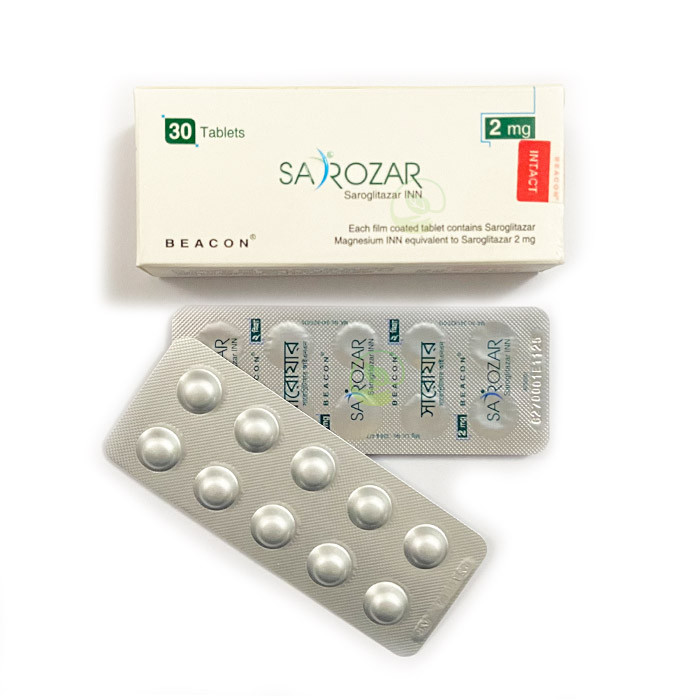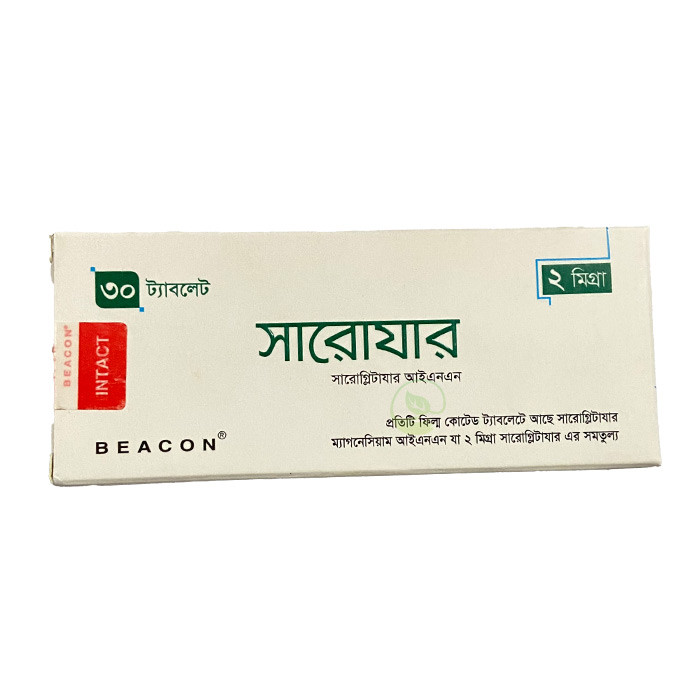

✔ 100% Authentic Product
👁️ Currently Viewing 9404
Saroglitazar is used in the treatment of Noncirrhotic Non-Alcoholic Steatohepatitis, Non-alcoholic fatty liver disease, and Diabetic dyslipidemia (high cholesterol in diabetes).
Discount
Price: ৳ 672
MRP:
৳
700
4%
Off

100% Genuine Products, Guaranteed

Safe & Secure Payments, Always

Fast, Secure & Efficient Delivery

Proper Packaging
 Cash on Delivery - All over Bangladesh
Cash on Delivery - All over Bangladesh Regular Delivery - 12-24 Hours, Dhaka City* Charge Tk.39-59
Regular Delivery - 12-24 Hours, Dhaka City* Charge Tk.39-59 Regular Delivery - 24-48 Hours, Other Cities* Charge Tk.99-110
Regular Delivery - 24-48 Hours, Other Cities* Charge Tk.99-110
 ফ্রি ডেলিভারিঃ - ৯৯৯ টাকা+ অর্ডারে, ঢাকা
শহরে
ফ্রি ডেলিভারিঃ - ৯৯৯ টাকা+ অর্ডারে, ঢাকা
শহরে ফ্রি ডেলিভারিঃ - ২৯৯৯ টাকা+ অর্ডারে, ঢাকার
বাহিরে
ফ্রি ডেলিভারিঃ - ২৯৯৯ টাকা+ অর্ডারে, ঢাকার
বাহিরে
100% Genuine Products, Guaranteed
Safe & Secure Payments, Always
Fast, Secure & Efficient Delivery
Proper Packaging
 Cash on Delivery - All over Bangladesh
Cash on Delivery - All over Bangladesh Regular Delivery - 12-24 Hours, Dhaka City* Charge Tk.39-59
Regular Delivery - 12-24 Hours, Dhaka City* Charge Tk.39-59 Regular Delivery - 24-48 Hours, Other Cities* Charge Tk.99-110
Regular Delivery - 24-48 Hours, Other Cities* Charge Tk.99-110 ফ্রি ডেলিভারিঃ - ৯৯৯ টাকা+ অর্ডারে, ঢাকা
শহরে
ফ্রি ডেলিভারিঃ - ৯৯৯ টাকা+ অর্ডারে, ঢাকা
শহরে ফ্রি ডেলিভারিঃ - ২৯৯৯ টাকা+ অর্ডারে, ঢাকার
বাহিরে
ফ্রি ডেলিভারিঃ - ২৯৯৯ টাকা+ অর্ডারে, ঢাকার
বাহিরে
✅ Description:
Sarozar 2mg Tablet is used for managing diabetic dyslipidemia and hypertriglyceridemia (high triglyceride levels) in individuals with Type 2 diabetes mellitus that is not adequately controlled by statin therapy.
Diabetic dyslipidemia is a condition characterized by elevated levels of triglycerides and LDL cholesterol, low levels of HDL cholesterol, and a predominant presence of small LDL particles. It is commonly associated with Type 2 diabetes mellitus.
Along with taking Sarozar 2mg Tablet, your doctor may advise making certain lifestyle modifications such as maintaining a healthy diet, ensuring adequate sleep, managing weight and stress, and quitting smoking and alcohol consumption.
Sarozar 2mg Tablet should be used cautiously in individuals with liver, kidney, or heart disease (with episodic congestive heart failure), as well as those with a history of muscle diseases. Pregnant women should use this medication with caution, and it is not recommended for use in breastfeeding women.
The safety and effectiveness of Sarozar 2mg Tablet have not been established in children. Therefore, it is essential to seek your doctor’s advice before administering this medication to children. Additionally, Sarozar 2mg Tablet should be used with caution in elderly patients.
Safety Advices

Alcohol
UNSAFE
It is unsafe to consume alcohol with Sarozar 2mg Tablet.

Pregnancy
CONSULT YOUR DOCTOR
Sarozar 2mg Tablet should be used with caution in pregnant women or women planning to have a baby. Consult with your doctor before taking it.

Breastfeeding
CAUTION
Sarozar 2mg Tablet is not recommended for use in breastfeeding women as it is not known if it passes through the breast milk. Consult your doctor before taking it.

Driving
SAFE
Sarozar 2mg Tablet does not usually affect your ability to drive.

Kidney
CAUTION
Sarozar 2mg Tablet should be used with caution in patients with abnormal kidney function. Consult your doctor before taking it.

Liver
CAUTION
Sarozar 2mg Tablet should be used with caution in patients with abnormal liver function. Consult your doctor before taking
✔️ Uses of Sarozar 2mg Tablet
Saroglitazar uses lies in treating major conditions like:
- Diabetic dyslipidemia (high cholesterol in diabetes).
- Hypertriglyceridemia with type 2 diabetes mellitus uncontrolled by statin therapy.
- Non-alcoholic fatty liver disease
- It lowers ‘bad’ cholesterol and fats (such as LDL, and triglycerides).
- It raises ‘good’ cholesterol levels (HDL).
The drug has also shown promising anti-diabetic medication properties by reducing the fasting plasma glucose and HBA1c in diabetes patients.
✔️ How does Sarozar 2mg Tablet work?
Sarozar 2mg Tablet contains Saroglitazar, a dual-action peroxisome proliferator-activated receptor (PPAR) inhibitor. It is used to manage high cholesterol, particularly triglycerides, and blood sugar levels in individuals with type 2 diabetes. Saroglitazar works through a unique mechanism by reducing the synthesis and secretion of triglycerides, a type of lipid or cholesterol in the blood. Additionally, it enhances the body's insulin sensitivity, allowing for better utilization of existing insulin and consequently lowering blood sugar levels.
✔️ Side Effects of Sarozar 2mg Tablet
- Gastritis.
- Asthenia (lack of energy).
- Pyrexia.
- Severe sweating and headache.
- Dizziness.
- Chest discomfort.
✔️ Quick Suggestions:
- Saroglitazar has beneficial effects in controlling both high cholesterol mainly triglycerides and sugar levels in diabetic patients.
- It is best to take Saroglitazar before the first meal of the day.
- You should continue to exercise regularly, eat a healthy diet, and take your other diabetes medicines along with Saroglitazar.
✔️ Indication of Sarozar 2mg Tablet
It is used to manage:
- Diabetic dyslipidemia
- Hypertriglyceridemia (high levels of triglycerides) with Type 2 diabetes mellitus which is not controlled by statin therapy
✔️ Pharmacology
Saroglitazar is a dual peroxisome proliferator-activated receptor (PPAR) agonist, primarily targeting PPAR-alpha and PPAR-gamma receptors. Activation of PPAR-alpha results in increased expression of genes involved in fatty acid oxidation, leading to decreased triglyceride levels. On the other hand, activation of PPAR-gamma improves insulin sensitivity and glucose uptake in peripheral tissues, thus aiding in glycemic control. This dual action addresses both dyslipidemia and hyperglycemia commonly seen in type 2 diabetes mellitus (T2DM).
Effects on Lipid Profile: Saroglitazar effectively lowers triglycerides and LDL cholesterol levels while increasing HDL cholesterol levels. By enhancing fatty acid oxidation and reducing hepatic triglyceride synthesis, helps normalize the lipid profile, thereby reducing the risk of cardiovascular events associated with dyslipidemia.
Effects on Glycemic Control: Saroglitazar improves insulin sensitivity and glucose utilization by peripheral tissues, leading to better glycemic control in patients with T2DM. By targeting insulin resistance and enhancing glucose uptake, it helps regulate blood glucose levels and reduces HbA1c levels over time.
Anti-inflammatory Properties: Saroglitazar exhibits anti-inflammatory effects by inhibiting the expression of pro-inflammatory cytokines and chemokines. This contributes to the overall improvement in metabolic parameters and reduces the risk of inflammation-induced complications in diabetes.
Clinical studies have demonstrated the excellent safety profile of Saroglitazar, with minimal adverse effects reported. It is well-tolerated by most patients, making it a suitable option for long-term management of T2DM and dyslipidemia.
Efficacy: Saroglitazar has shown higher efficacy compared to traditional therapies in optimizing both lipid and glycemic targets. Its dual regulatory mechanism offers comprehensive management of dyslipidemia and hyperglycemia, leading to improved cardiovascular outcomes and overall patient outcomes.
Saroglitazar, as a dual PPAR agonist, offers a promising approach to the management of both dyslipidemia and T2DM. Its multifaceted pharmacological effects on lipid metabolism, glycemic control, and inflammation make it a valuable therapeutic option for patients requiring comprehensive management of metabolic disorders. However, further research is warranted to explore its long-term safety and efficacy in diverse patient populations.
✔️ Dosage & Administration of Sarozar 2mg Tablet
Take Sarozar 2mg Tablet as advised by your doctor. Swallow the medicine with a glass of water. Do not crush or chew the medicine. Your doctor will decide the correct dose and duration for you depending upon your age, condition, and body weight.
✔️ Interaction of Sarozar 2mg Tablet
- Interaction with Alcohol: The specific interaction of the medication with alcohol is unknown. It is recommended to consult your doctor before consuming alcohol while taking this medication.
- Interaction with Other Medicines: The potential interactions of this medication with other drugs are not specified. It is advisable to inform your doctor about all the medications you are currently taking, including prescription drugs, over-the-counter medicines, vitamins, and herbal supplements. Your doctor can evaluate the potential interactions and adjust your treatment regimen accordingly.
- Disease Interactions: Information about interactions with specific diseases is not available. However, it's essential to inform your doctor about any existing medical conditions or history of diseases before starting this medication, as certain health conditions may affect how the medication works or increase the risk of adverse effects.
- Food Interactions: Details about interactions with food are not provided. Nevertheless, some medications may interact with certain foods or dietary components, affecting their absorption or metabolism. It's advisable to discuss any dietary considerations with your doctor or pharmacist.
- Lab Interactions: Information regarding interactions with laboratory tests is not available. However, certain medications may interfere with the results of certain lab tests, leading to inaccurate or misleading outcomes. Inform your healthcare provider about all the medications you are taking before undergoing any laboratory tests.
✔️ Contraindications
Saroglitazar is not recommended for use if you are allergic to it.
✔️ Pregnancy & Lactation
- Saroglitazar is not recommended during pregnancy as it may harm your fetus. Consult your doctor if you are pregnant.
- It is not known if Saroglitazar passes into breast milk. Therefore, this medicine is not recommended while breastfeeding unless necessary. All the risks and benefits should be discussed with your doctor before taking this medicine.
✔️ Precautions & Warnings
- Take Saroglitazar at the same time each day to help establish a routine and improve medication adherence. This consistency can aid in better management of your condition.
- Always check the expiry date before taking Saroglitazar. Do not use the medication if it has expired. Store the medicine in a safe place, away from children and pets.
- Maintain a low-salt and low-fat diet as recommended by your doctor while taking Saroglitazar. Additionally, regular exercise can complement the effects of the medication and contribute to better results in managing your condition.
- Your doctor may advise periodic blood tests to monitor your lipid levels and assess your response to Saroglitazar treatment. It's essential to attend these follow-up appointments and undergo the recommended tests as part of your ongoing care.
- Saroglitazar is not recommended for use in children below 18 years of age as the safety and efficacy data are not clinically established.
✔️ Storage Conditions
- Keep Sarozar 2mg Tablet out of reach of children
- Store at room temperature below 25°C
⚠️Disclaimer:
At ePharma, we’re committed to providing accurate and accessible health information. However, all content is intended for informational purposes only and should not replace medical advice from a qualified physician. Please consult your healthcare provider for personalized guidance. We aim to support, not substitute, the doctor-patient relationship.






